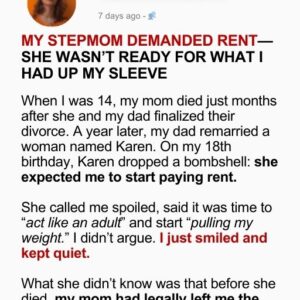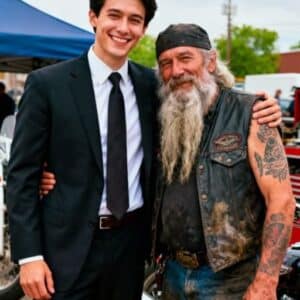When my son was five, he’d point at a local news anchor and yell, “Daddy!” My wife would laugh and say kids live in their own world. I joked along, changed the channel, never thought twice.
Nine years later, the same anchor—Rafael Medina—popped up on TV. I called into the kitchen, “Tomas! Come see your TV dad!” He walked in, took one look at the screen, and went white.
“His name’s Rafael Medina, right?” he said.
“Yeah,” I said slowly. “Why?”
“I’ve seen him before,” Tomas whispered. “Not just on TV.”
My wife, Clara, came in wiping her hands on a towel. She gave Tomas a quick scan, then looked at me like there was a conversation we should’ve had years ago. Tomas stared at the screen, then said, steady and small:
“I think he’s my real dad.”
Silence. I tried to laugh and swallowed glass instead. Tomas stormed upstairs. His door shut—no slam, just a heavy, final click.
I turned to Clara. “What is he talking about?”
She sat down like her legs forgot what they were for. “I knew Rafael,” she said. “Before you. We went out a few times. He stopped calling. I met you. I didn’t know I was pregnant until later. And then… you were steady. You were good. I didn’t know how to tell you without losing you.”
It felt like the floor shifted an inch to the left and never came back. For days, the house was a tightrope. Tomas avoided us. Clara cried quietly. I floated through work like gravity was optional.
One afternoon I found Tomas on YouTube, watching old clips of Rafael reporting in too-bright lighting from a flood zone. I sat beside him.
“Trying to see if you’ve got his nose?” I asked.
He didn’t smile. “Why didn’t you tell me?”
“I didn’t know,” I said. “And even if I had—” I took a breath. “Even if I had, I’d still have wanted to be your dad.”
He nodded once, eyes on the screen. “Do you think I should meet him?”
“Do you want to?”
“I don’t know. I just… want to see if he knows I exist. If he cares.”
We wrote Rafael a message through a PR contact of Clara’s—simple, private, no big reveal, just a coffee with an old acquaintance. He agreed. Clara went to the café while I waited around the block, gripping the steering wheel until my hands hurt. She came back forty-five minutes later, eyes red but voice calm.
“He doesn’t remember me,” she said. “My name rang a bell, but the rest? Nothing. I told him it was about a kids’ charity segment so he’d stay. He was… polite.”
“Polite,” I repeated. “Great.”
We told Tomas Rafael wasn’t interested in digging up the past. He nodded like he understood and then spent the next few weeks not doing homework, mouthing off, drifting. One rainy afternoon he didn’t come home. Phone off. We were minutes from calling the police when the front door opened and he stepped in, soaked and shivering.
“Where were you?” I asked.
“The station,” he mumbled. “Channel 5. I waited outside. Thought he might… see me.”
“Did he?”
“He didn’t look. Got in a car.” He went upstairs. No slam this time—just a quiet door that felt louder.
I stood, grabbed my jacket.
Clara asked, “Where are you going?”
“To the station,” I said. “Because he doesn’t get to walk away thinking none of this matters.”
I didn’t storm in. I waited on the sidewalk through lunch breaks and smoke breaks and changing shifts. On the third day I saw him—tan suit, perfect hair, sunglasses on under a gray sky. I stepped forward.
“Mr. Medina?”
He flashed a quick anchor smile. “Sorry, no autographs today.”
“I’m not here for that.” I kept my voice level. “You dated a woman named Clara eighteen years ago. You ghosted her. She had a son.”
His face shut down so fast it was almost impressive.
I held out a photo. Tomas at twelve, grinning, holding a science trophy like it weighed nothing. “He thought you might be proud.”
Rafael barely glanced before handing it back. “I’m sorry. I’m not looking to get involved in anything complicated.”
“Being a father isn’t supposed to be convenient,” I said.
He walked away.
I wanted to yell after him. I didn’t. I went home and pulled my son into a hug that lasted long enough for the rain to dry on our shirts.
After that, something shifted—not in Rafael, in us. Tomas stopped trying to chase a shadow. He started walking with me at dawn, riding bikes on Saturdays, losing and then beating me at chess. One night he said, “Thanks for being mad at him.”
“Thanks for letting me be,” I said.
His eyes glossed and he said it like he’d been holding it in for years: “You’re my real dad.”
A year later he wrote a scholarship essay titled “The Man I Look Nothing Like, But Everything Feels Like Home With.” He read it at a banquet and when he finished there wasn’t a dry eye in the room. The janitor clapped hardest. Walking out, he pressed the printed pages into my hand.
“Keep this,” he said. “In case you ever forget how much you matter.”
I slid it into my sock drawer next to the brittle hospital bracelet from the day we brought him home.
Not every story ties itself in a bow. Some truths show up in the middle of dinner and tilt your house on its axis. Some men on TV stay men on TV. But I learned something I should’ve known all along:
Fatherhood isn’t blood. It’s showing up. It’s staying put. It’s holding the line when a kid looks elsewhere for answers and loving him so steadily he finally sees what he already has.
And the cleanest revenge isn’t a dramatic confrontation or a DNA test on daytime TV. It’s a boy who grows into a man and chooses to write about the dad who showed up, not the one who didn’t.





